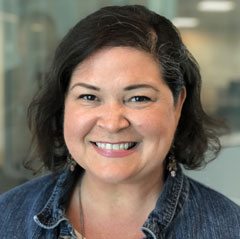FIU students in education design interventions to satisfy new state guidelines and improve learning.

Feb 23, 2020, 9:00 PM.
article key points
Online graduate students learn to use big data and technology in K-12 classrooms.
Teaching has changed quite a bit over the last decade. New technology, accountability and requirements have transformed the way teachers from K-12 instruct children and teens. In response, Florida International University master’s degree students in education, are learning to use big data and technology in their classrooms to improve the way children learn. The aim? To reach every child at their level and to make progress in their learning capacity.
Accountability in the classroom
“A lot of the new guidelines have shifted in the field and have required teachers to collect data and to provide instruction based on those data,” said Elizabeth Cramer, Ph.D., professor and online graduate program director of special education in the Department of Teaching and Learning at FIU. Cramer stated that collecting data and using it to enhance learning is a core method of special education, but now, it’s an approach used across the entire education field.
“In the era of accountability, with RTI (response to intervention) implemented across the nation, teachers can no longer teach and hope it’s working. They are required to probe students and provide performance reviews,” she explained.
Action research capstone
Special education graduate students are armed with a complete framework that can be implemented immediately with an action research capstone. The research-based final project, puts what’s learned in an education program to immediate use in a classroom setting.
Essentially, teachers pilot an intervention within their own classrooms. First, they identify a problem, do the research, design a solution, collect data at the beginning, during and end, report their findings and modify instruction to drive learning progress in their students.
“It’s evidence-based practice within the bounds of education” stated Cramer who offered that the research can involve one student or an entire class implemented over eight to 12 weeks. Additionally, the projects must be approved by the professor and have special permissions from principals and parents.
“This is where the online degree programs come to life. The action research project is an accumulation of all the things they have learned over the program,” expounded Cramer.
Teaching based on data
“I honestly didn’t know what I was getting into. I didn’t know what to expect. Other than that, I knew to expect intensity, but it was the biggest mental challenge I’ve ever gone through in my life, however, I learned so much. I was able to have a few pieces published, work with families and with students with disabilities,” stated alumna Natasha Quesada, who graduated in 2019. Quesada was enrolled in a hybrid special education program with FIU, with both online and face-to-face classes. She currently teaches fourth-grade general education, reading and language arts in Miami, FL.
“Inside the classroom, I learned how to collect data and use it to drive education,” confirmed Quesada.
Technology helps
Karina Constantine, a special education teacher at Whispering Pines Elementary in Boca Raton, FL agrees with Quesada and feels she gained a wealth of knowledge with her project. Constantine graduated in 2019 and is currently pursuing her Ph.D. in special education with FIU. Her objective is to make a marked difference in the world of autism spectrum disorders and exceptional student education through her research.
“As a special needs teacher, I have the ‘toughest’ kids in my classroom as they’re mostly non-verbal. It’s not easy at all. They require a lot of out-of-the-box thinking, creativity and love. And FIU’s master’s degree in special education taught me what I needed to be able to help these children, especially with technology,” Constantine affirmed.
Cramer says she’s seen the rewards of the action research project firsthand through those who receive interventions, the families that benefit and the teachers who make a difference. She also sees benefits for those who are learning online. Also, the research produced has obvious value for the field.
“It’s rewarding, but hard work. It has an impact beyond just the project,” Cramer declared.
